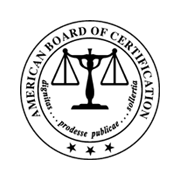
506 N. Armenia Ave. Tampa FL 33609 | 813-870-3100
Dischargeability of Debts in Bankruptcy:
While most debts on most bankruptcy cases get eliminated without problem, there are some debts that cannot be eliminated. These are described as nondischargeable debts. Some are fairly easy to describe. Alimony and child support are some of the most common ones that cannot be eliminated. Most student loans cannot be eliminated, though it can be complicated as to what qualifies as a student loan for bankruptcy purposes. Also, student loans can sometimes be discharged for 'undue hardship' in certain cases, so this can get very complicated and fact intensive.
Clients generally understand that they generally cannot keep cars or houses, or other items securing loans without paying for them (including liens from stores financing their own merchandise through their own financing: Badcock being the most aggressive of these creditors; but could include jewelers or others. Note Mastercard, Visa, and American Express do not retain liens on merchandise purchased through them. Property taxes also need to be paid to keep the property that was taxed.
On the other hand, just because a creditor sued you, got a judgment against you, and recorded the judgment as a lien against your house does not mean you can't eliminate that debt while keeping your house. Usually in Florida, if you were living in the house as your home when the judgment was entered, and continue to live in it through the bankruptcy, we can get rid of that lien. Also if the house is in the name of a husband and wife, and the judgment is only against one of them, it may not actually be a lien on the house.
Other debts that can't be eliminated include recent taxes (again it can get complicated, but one condition is that if the tax return was due within 3 years of the date the bankruptcy was filed, they cannot be eliminated) and some taxes cannot be eliminated even if much older, such as taxes an employer was supposed to pay and some sales taxes. One issue that can surprise people is that if taxes are charged on a credit card, that creditor card debt might take the same nondischargeable status as the taxes that were paid.
If a creditor is not listed on a bankruptcy in time for them to file to get paid in the bankruptcy (if there is any payment to creditors) this would usually be a basis to find that the debt is not discharged.
If the debtor files chapter 7 bankruptcy, property settlements are not eliminated in bankruptcy. This could be a reason to look at filing chapter 13 instead, which normally does eliminate this type of debt.
Debts from injuries or death from auto accidents can cause problems if the debtor caused the accident and was driving operating under the influence of alcohol or drugs illegally.
Debts for restitution and many criminal fines or penalties may not be dischargeable.
One that is important and comes up often is dues to homeowners or condominium or similar associations. While bankruptcy can usually eliminate liability for these that came due before the bankruptcy, if the debtor is not keeping the related property; the 2005 bankruptcy law made debtors still liable for any assessments that come due after the bankruptcy was filed until the title to the property is transferred out of the debtor's name.
Possibly the most complicated area of litigation in this area is debts related to fraud, misrepresentation, or defalcation by the debtor. The requirements here are different for statements made orally and made in writing. Generally creditors need to show that the representation was false, and the debtor knew or reasonably should have known it was false when it was made. Or that a debtor committed some sort of fraud on the creditor. In nearly every case the debtor promises to pay debts that it ends up they can't pay. This is not what the law refers to. Instead it would refer to substantial misrepresentations of income or assets, or other matters that the creditor relied in in giving credit. These cases are still fairly rare, and if the creditor files such a suit against a debtor in bankruptcy, and loses, it may have to repay the debtor for all fees the debtor incurred in fighting the suit.
If the debtor is in a special relationship with the creditor – called a fiduciary relationship, the standard is much looser. This would be if the debtor was handling money belonging to the creditor (such as a child handling their parents funds, or a business or professional holding money belonging to the debtor). If the money is mishandled, it could lead to a finding that the debt is not eliminated.
Bankruptcy can be a complicated process, even more so with the wrong attorney. It is much safer to get a board certified attorney with substantial experience that asks the right questions to find out if there are any potential problems in the case and try to avoid them.
Michael Barnett, Esq.
Michael Barnett, PA
506 N Armenia Ave.
Tampa, FL 33609-1703
813-879-3100
Over 25 Years in Florida

Michael Barnett has provided his services in and around Tampa, Florida covering Hillsborough, Pasco and Polk County for over 20 years.
Board Certified

Mr. Barnett is board certified by the American Board of Certification in consumer bankruptcy law, and has been board certified since January 1993.
BBB Accredited

The BBB has determined that this business meets accreditation standards.